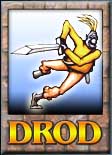The Eighther Currency
The Greckle
The Glorthorred currency is the currency favored for trade between nations all over the Eighth because of its stability and the high standard of quality of the metals it is made out of. There are only two coins – the Greckle, which has the approximate monetary value of 1 US Dollar, and the Grubble, which has 1/1000 of this value (meaning it is in some ways a bit redundant). Objects in the Eighth often have similar values to those here, although this does vary depending on location and time. Food, building materials and architectural services are the notable exceptions, since all three are in huge demand on the Eighth at most times. The yearly floods [Link] force people to stockpile their resources throughout the rest of the year for storage as food becomes reasonably scarce during that time. In addition, dungeons and other subterranean architecture are always in demand, especially by the rich and powerful for various reasons, while architects are rare and sometimes reluctant to accept a contract, which means that many are willing to pay extremely large sums of money in order to get something built. The coins themselves are made of metals that have much less value than their trading value, so it is possible to counterfeit them and forge fake coins, but it requires a high level of expertise and expensive manufacturing equipment to create coins capable of deceiving a careful eye.
Currencies of the Eighth
Ephelna, a close trading partner with Glorthorred in Beethro’s time, adopted the Greckle as its native currency, since it was thought that by lifting the barrier caused by currency conversion, economic benefits would be gained by both sides. Before Ephelna made this decision to use the Glothorred currency, the conversion of money between the two currencies usually carried with it an implicit charge, dependent on both the shrewdness of the converter and the ignorance of the person getting his money converted. This disfavored the growth of trade between the continents for many years, since traders could not be sure if they were getting a good deal or not from fellow traders on the other continent, and so, they often refused to accept deals and contracts from each other. This eventually led to a mass complaint from Ephelnan traders and citizens who couldn’t obtain the Glorthorredian goods they needed, and so, negotiations between Ephelna and Glorthorred were started with the goal of getting both continents to cooperate and use the same currency. Unfortunately, there was one problem that neither side could agree on – which currency both continents should use. The argument lasted for nearly a year, and was so intense that the entire negotiation committee, at that time in Ephelna, nearly forgot about the yearly floods and got washed away (it was only when a messenger warned them of approaching floodwaters that they evacuated the building and got into their escape boat). The sheer determination of the Glorthorredians, however, eventually decided the matter. The Ephelnan committee finally ran out of arguments, and so agreed that the quality and stability of the Greckle were far better.
The Clarbagi, on the other hand, preferred to trade with physical goods, and never adopted a native currency. They felt that money was a virtual invention and wasn’t actually worth anything, for they valued goods based on their usefulness, rather than on pieces of metal that they regarded as mostly useless. Although it made trading much more difficult in terms of knowing what was a good deal, and what was not, it had the distinct advantage that anything that could be traded within Clarbag could never become extremely over–valued, relative to essential resources such as food. As a result, ornamental items are rare among Clarbagi, and usually only used for trading with other continents. Most Clarbagi do accept the use of Greckles, however, especially in major towns and trading areas, although there are many that will avoid doing so unless absolutely necessary.
The continents of Rasarus and Tueno also accept Greckles, but they still retain their own currencies, regarding them as an important aspect of their sovereignty and tradition. Rasarians are especially unfussy about exactly how they trade, and will trade in almost any currency or goods that they can get their hands on. Of course, it makes absolutely no difference at all to their thieving natures, and any trade with a Rasarian will usually end up with the trader losing a lot of money.
Akandia, by some accounts, has a society that doesn’t really rely on economic transactions in any way. In fact, Zealot’s Plague usually removes any desires the sufferer has for gaining wealth and power, so currency is generally not needed by any Akandians, who are generally happy to share things with each other. The vastness of the Eighth is such that there are also many small islands and land regions which are isolated enough that they still retain their own currencies and trading customs. Most do accept Greckles, but are often independent of the major continent powers, and so are free to make their own decisions and policies.
